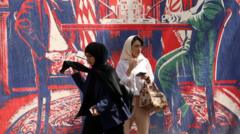The International Atomic Energy Agency warns that Iran's growing uranium stockpile, now capable of yielding nuclear weapons, poses a significant threat amid ongoing negotiations.
Iran's Uranium Stockpile Surge Raises Alarm, Says UN Nuclear Watchdog

Iran's Uranium Stockpile Surge Raises Alarm, Says UN Nuclear Watchdog
UN agency reveals Iran drastically increases high-grade uranium levels, sparking global concerns.
Iran has reportedly accelerated the enrichment of uranium to levels that have raised alarms globally, according to a confidential report from the International Atomic Energy Agency (IAEA). The agency revealed that Tehran has amassed over 400kg of uranium enriched to 60% purity, marking nearly a 50% increase in just three months. This level of enrichment is concerning as it approaches weapons-grade quality, proceeding at a rate sufficient to potentially produce one nuclear weapon per month.
IAEA Director General Rafael Grossi expressed "serious concern" regarding Iran's nuclear activities, emphasizing that the enhanced production contradicts Iran's claims of having a peaceful nuclear program. Despite these assertions, the organization cannot confirm the peaceful intentions behind Iran's uranium enrichment amidst ongoing negotiations with the United States.
The recent IAEA findings have prompted the US, UK, France, and Germany to consider pressing for actions against Iran, substantiating claims of non-compliance with international nuclear regulations. In reaction to the report, Israeli officials declared that Iran's activities signal a determined pursuit of nuclear weapons, with Prime Minister Benjamin Netanyahu stating there is no civilian justification for such high levels of enrichment.
While Iranian officials, including Foreign Minister Abbas Araghchi, refute claims of an intention to develop nuclear weapons, there are rising concerns that Iran could alter its stance under mounting international pressure. Recent comments from advisors to Supreme Leader Ayatollah Ali Khamenei hint at the possibility of reconsidering their nuclear weapon's position should pressures escalate.
As the IAEA prepares for an upcoming board meeting to address the situation, there is increasing pressure on Iran to fully comply with nuclear non-proliferation norms, bringing the potential for Iran to be referred to the UN Security Council for further action in the near future.
IAEA Director General Rafael Grossi expressed "serious concern" regarding Iran's nuclear activities, emphasizing that the enhanced production contradicts Iran's claims of having a peaceful nuclear program. Despite these assertions, the organization cannot confirm the peaceful intentions behind Iran's uranium enrichment amidst ongoing negotiations with the United States.
The recent IAEA findings have prompted the US, UK, France, and Germany to consider pressing for actions against Iran, substantiating claims of non-compliance with international nuclear regulations. In reaction to the report, Israeli officials declared that Iran's activities signal a determined pursuit of nuclear weapons, with Prime Minister Benjamin Netanyahu stating there is no civilian justification for such high levels of enrichment.
While Iranian officials, including Foreign Minister Abbas Araghchi, refute claims of an intention to develop nuclear weapons, there are rising concerns that Iran could alter its stance under mounting international pressure. Recent comments from advisors to Supreme Leader Ayatollah Ali Khamenei hint at the possibility of reconsidering their nuclear weapon's position should pressures escalate.
As the IAEA prepares for an upcoming board meeting to address the situation, there is increasing pressure on Iran to fully comply with nuclear non-proliferation norms, bringing the potential for Iran to be referred to the UN Security Council for further action in the near future.



















